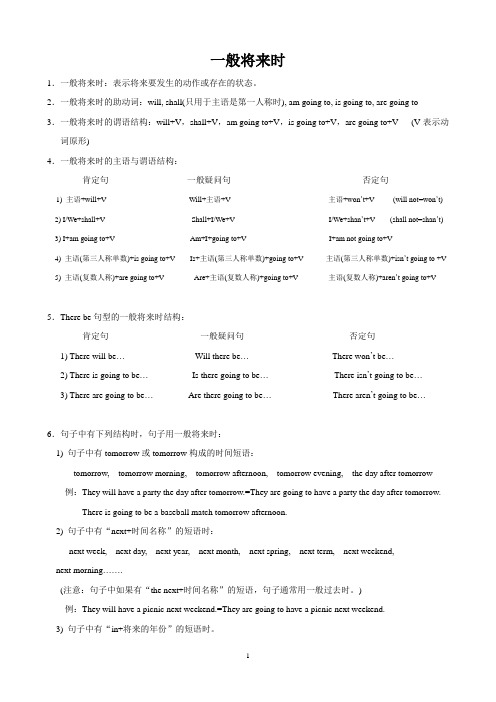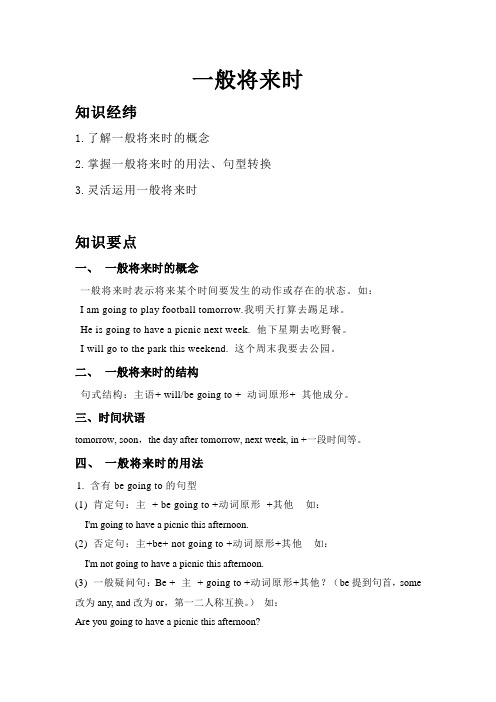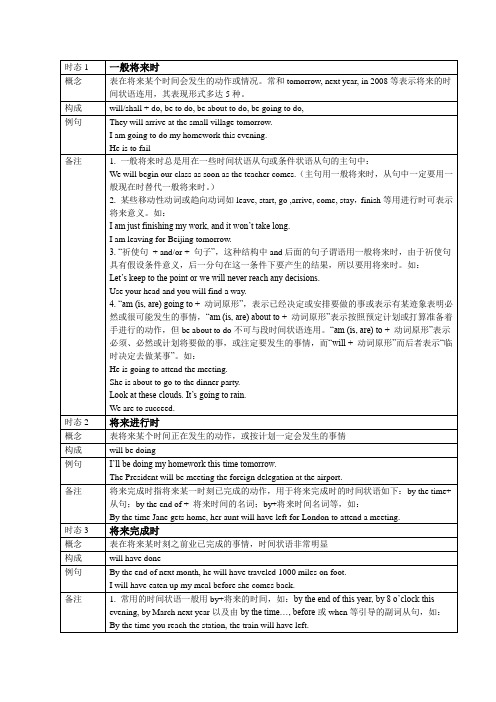一般将来时2
一般将来时的多种表达法之区别

一般将来时的多种表达法之区别一般将来时的用法特点主要有如下几点:1、表示一个次要发生的动作或状态,“will/shall+动词原形”,will用于各人称,shall只有于第一人称。
表示将来的时间状语有tomorrow, next year, next time, in an hour, when he comes等。
如:It’ll soon be Christmas. 很快就到圣诞节了。
I will see you tomorrow. 明天我去看你。
2、be going to在口语中常用来表示已经决定或安排要做的事,也用来表示必然,很可能发生的事或自然现象。
如:I’m going to see the film tonight. 今晚我打算去看电影。
It’s going to be a fine day tomorrow. 明天将会是个好天。
3、在时间或条件等状语从句中不用将来时,可用一般现在时或现在完成时来代替。
如:If he has sold/sells his newspapers, he’ll go home. 卖完了报纸他就回家。
4、be doing 表将来的用法常用于这种结构的动词有:go, come, leave, start, begin, run, leave, stay, do, take等。
这种用法往往指安排好的一般不会更改的即将发生的动作。
I’m doing my experiment tomorrow. 明天我们做实验。
She’s leaving early tomorrow morning. 明天她很早就出发。
5、一般现在时表将来除在条件句和时间状语从句中,在主句中也可用一般现在时表将来,表示按计划安排、时间表等严格执行的行为。
如:The sports meet takes place on October 18. 运动会将于十月十八日举行。
The train leaves at eight every morning from this station. 火车每天早晨八点从本站出发。
一般将来时用法总结

一般将来时1.一般将来时:表示将来要发生的动作或存在的状态。
2.一般将来时的助动词:will, shall(只用于主语是第一人称时), am going to, is going to, are going to3.一般将来时的谓语结构:will+V,shall+V,am going to+V,is going to+V,are going to+V (V表示动词原形)4.一般将来时的主语与谓语结构:肯定句一般疑问句否定句1) 主语+will+V Will+主语+V 主语+won’t+V (will not=won’t)2) I/We+shall+V Shall+I/We+V I/We+shan’t+V (shall not=shan’t)3) I+am going to+V Am+I+going to+V I+am not going to+V4) 主语(第三人称单数)+is going to+V Is+主语(第三人称单数)+going to+V 主语(第三人称单数)+isn’t going to +V5) 主语(复数人称)+are going to+V Are+主语(复数人称)+going to+V 主语(复数人称)+aren’t going to+V5.There be句型的一般将来时结构:肯定句一般疑问句否定句1) There will be…Will there be…There won’t be…2) There is going to be…Is there going to be…There isn’t going to be…3) There are going to be…Are there going to be…There aren’t going to be…6.句子中有下列结构时,句子用一般将来时:1) 句子中有tomorrow或tomorrow构成的时间短语:tomorrow, tomorrow morning, tomorrow afternoon, tomorrow evening, the day after tomorrow 例:They will have a party the day after tomorrow.=They are going to have a party the day after tomorrow.There is going to be a baseball match tomorrow afternoon.2) 句子中有“next+时间名称”的短语时:next week, next day, next year, next month, next spring, next term, next weekend,next morning…….(注意:句子中如果有“the next+时间名称”的短语,句子通常用一般过去时。
一般将来时

一般将来时知识经纬1.了解一般将来时的概念2.掌握一般将来时的用法、句型转换3.灵活运用一般将来时知识要点一、一般将来时的概念一般将来时表示将来某个时间要发生的动作或存在的状态。
如:I am going to play football tomorrow.我明天打算去踢足球。
He is going to have a picnic next week. 他下星期去吃野餐。
I will go to the park this weekend. 这个周末我要去公园。
二、一般将来时的结构句式结构:主语+ will/be going to + 动词原形+ 其他成分。
三、时间状语tomorrow, soon,the day after tomorrow, next week, in +一段时间等。
四、一般将来时的用法1. 含有be going to的句型(1) 肯定句:主+ be going to +动词原形+其他如:I'm going to have a picnic this afternoon.(2) 否定句:主+be+ not going to +动词原形+其他如:I'm not going to have a picnic this afternoon.(3) 一般疑问句:Be + 主+ going to +动词原形+其他?(be提到句首,some 改为any, and改为or,第一二人称互换。
)如:Are you going to have a picnic this afternoon?肯定回答:Yes, I am.否定回答:No, I’m not.2. 含有will的句型(will可用于所有人称,shall只用于第一人称I和we)( 1 ) 肯定句:主+ will +动词原形+其他如:I will play football tomorrow.(2) 否定句:主+ won’t +动词原形+其他(will后加not成won't)如:I won’t play football tomorrow.(3) 一般疑问句:Will + 主+ +动词原形+其他?(will提到句首,some改为any, and改为or,第一二人称互换) 如:Will you play football tomorrow?肯定回答:Yes, I will.否定回答:No, I won’t.五、一般将来时的特殊疑问句一般情况下,一般将来时的对划线部分有三种情况。
一般将来时,将来进行时,将来完成时

1.I won’t be able to attend the meeting tonight because____then.A. I must have a classB. I will be teaching a classC. I teach a classD. I will have taught a class2. -----Could you give these books to Mr. Black?-----Absolutely, ___ him at five this afternoon.A. I will have a talk withB. I have a talk withC. I can have a talk withD. I will be having a talk with3. I’m afraid I won’t be available then. I ___ a friend at three this afternoon.A. seeB. am seeingC. will seeD. will be seeing4. Next Friday I will go to another concert. They ____ some thing by Mozart at that time.A. playB. will be playingC. are going to playD. are to play5. -----What are you doing, Jack?-----Make a model plane. I ____ it in the science class at 10 o’clock tomorrow morning.A. will be showingB. am going to showC. showD. have showed1. 下星期这时候我们将在那个工厂劳动。
一般将来时态讲解(共25张PPT)

• I don't think the test will be very difficult. 。
②用于“祈使句 + and + 陈述句” 中
I don’t think it will rain this afternoon.
I am hungry. I think I’ll have something to eat.
表示看法,观点
“There be”句型的一般将来时 肯定句: There will be +名词+其他成份 [注意]:无论后面加单数名词或复数形式,be都必须用原形。
shall适用于第一人称I,We;而will适用于所有人称。 通常可以用will来代替shall。 will,shall均可缩写为:'ll,如:
I will= I'll; she will = she’ll;will not 和shall not分别可以 缩写为 won't 和shan't。
1.一般将来时的用法
4. be about to + 动词原形。 表示 (1)“即将做”或“马上做”
(2)因此,句子不能再用时间状语。
Don’t leave. Li Lei is about to come. 不要走了,李蕾就要来了。 Be quiet. The concert is about to start. 安静下来,音乐演唱会就要开始了。
• My uncle will come to see me every Saturday.
• 我叔叔每个星期六都会来看我。
• The students will have five English classes per week this term.
“一般将来时”的几种语法形式[整理版]
![“一般将来时”的几种语法形式[整理版]](https://img.taocdn.com/s3/m/6c03bef44bfe04a1b0717fd5360cba1aa8118c39.png)
“一般将来时”的几种语法形式一般将来时的语法形式主要有四种:shall / will +动词原形;be going to +动词原形;现在进行时和一般现在时。
现将这四种形式分述如下:一、shall / will +动词原形1. will可用于所有人称,但shall 仅表示单纯将来时,用于第一人称I和we,作为will的一种替代形式。
以Y ou and I为主语时通常避免用shall。
例如:He will be back soon. 他很快就会回来。
I shall/will be free on Sunday. 星期天我有空。
Y ou and I will work in the same factory. 你和我将在同一工厂工作。
2. will, shall可用来预言将来发生的事。
如说出我们设想会发生的事,或者请对方预言将要发生什么事。
例如:It will rain tomorrow. 明天将要下雨。
3. will, shall除可表示单纯的将来时以外,还可以带有意愿的色彩,仍指的是将来。
例如:I’ll buy you a bicycle for your birthday. 你过生日时,我给你买一辆自行车。
(表示允诺) Will you open the door for me please? 请你帮我开门好吗?(表示请求)Shall I get your coat for you? 我可以为你拿外套吗?(表示提议)二、be going to +动词原形1. 表示说话人根据现在已有的迹象,判断将要或即将发生某种情况。
这类句子的主语可以是人,也可是物。
例如:There is going to be a football match in our school tomorrow afternoon. 明天下午我们学校将有一场足球赛。
(已有告示)I feel terrible. I think I’m going to die. 我感到难受极了,我想我快不行了。
一般将来时的四种表示方法
一般将来时的四种表示方法
将来时 (Future Tense) 是表示动作或状态在未来发生的时态。
常见的将来时表达方式包括:
1. 直接将来时 (Simple Future Tense):用动词的将来时态表示将来的动作或状态。
例如:“I will go to the party tonight.”
2. 将来进行时 (Future Continuous Tense):用动词的将来进行时态表示将来正在进行的动作或状态。
例如:“I will be studying for my exam this weekend.”
3. 将来完成时 (Future Perfect Tense):用动词的将来完成时态表示将来某个时间之前已经完成的动作或状态。
例如:“By next year, I will have graduated from college.”
4. 将来完成进行时 (Future Perfect Continuous Tense):用动词的将来完成进行时态表示将来正在进行并且将会在未来某个时间
完成的动作或状态。
一般将来时的知识点归纳整理
一般将来时的知识点归纳整理1. 构成:一般将来时由“助动词will/shall +动词原形”构成。
例如:I will go to the movies tonight.(我今晚将去看电影。
)2. 否定形式:在助动词will之后加not构成否定句。
也可以使用缩写形式won't(will not的缩写)。
例如:They won't be late.(他们不会迟到。
)3. 疑问形式:将助动词will置于主语之前形成疑问句。
例如:Will you join us for dinner?(你会和我们一起吃晚饭吗?)4.表示将来时间:(1)用于表示计划、安排或意图的动作、活动。
例如:They will visit Beijing next month.(他们下个月将访问北京。
)(2)用于表示预测、推测或判断的动作、现象。
例如:It will rain tomorrow.(明天会下雨。
)(3)用于表示预测、推测的事实或客观存在。
例如:He will be a great musician in the future.(他将来会成为一位伟大的音乐家。
)5. 时间状语:一般将来时通常与一些表示将来时间的状语连用,如tomorrow(明天)、next week(下周)、in the future(将来)等。
例如:She will start her new job next Monday.(她下周一将开始新的工作。
)6.与其他时态的关系:(1)过去将来时:在过去的其中一时间,表示在那个时间将来发生的动作。
例如:When I saw Tom, he said he would help me.(当我看到汤姆的时候,他说他会帮助我。
)(2)现在进行时表示将来:用现在进行时表示按计划或安排即将发生的动作。
例如:We are leaving for Paris tomorrow.(我们明天动身去巴黎。
)7.注意事项:(1)一般将来时不能用于表示客观真理、永久性事实或习惯性动作。
一般将来时的构造和用法
一般将来时的构造和用法一般将来时是英语中表示将来发生的动作或事件的时态。
它用来描述将来某一时间或情况下预计会发生的事情。
一般将来时的构造和用法有以下几种。
1. 肯定句结构:主语 + will + 动词原形 + 其他2. 否定句结构:主语 + will + not + 动词原形 + 其他3. 一般疑问句结构:Will + 主语 + 动词原形 + 其他?4. 特殊疑问句结构:特殊疑问词 + will + 主语 + 动词原形 + 其他?下面将分别对这些句子结构进行详细解释和示例。
1. 肯定句结构:主语 + will + 动词原形 + 其他肯定句结构用于表达预测、打算、意愿和承诺等将来发生的动作或事件。
以下是一些例句:- I will go shopping tomorrow.(我明天会去购物。
)- They will visit their grandparents next week.(他们下周会去拜访他们的祖父母。
)- She will study abroad next year.(她明年会出国留学。
)2. 否定句结构:主语 + will + not + 动词原形 + 其他否定句结构表示将来某一时间或情况下不会发生的动作或事件。
以下是一些例句:- He will not attend the meeting tomorrow.(他明天不会参加会议。
)- We will not travel to Europe next summer.(我们下个夏天不会去欧洲旅行。
)- The party will not start until 8 p.m.(晚会直到晚上8点才开始。
)3. 一般疑问句结构:Will + 主语 + 动词原形 + 其他?一般疑问句结构用来询问预测、打算、意愿和承诺等将来发生的动作或事件是否会发生。
以下是一些例句:- Will you attend the conference tomorrow?(你明天会参加会议吗?)- Will they come to our party this weekend?(他们这个周末会来我们的派对吗?)- Will she finish her project on time?(她会按时完成她的项目吗?)4. 特殊疑问句结构:特殊疑问词 + will + 主语 + 动词原形 + 其他?特殊疑问句结构用来询问关于将来动作或事件的特定信息。
一般将来时动词变化规则
一般将来时动词变化规则一般将来时是英语中表示将来发生的动作或状态的时态。
在一般将来时中,动词的变化规则是非常重要的,因为它们决定了动词在不同人称和数上的变化形式。
在本文中,我们将讨论一般将来时动词的变化规则,以便帮助读者更好地掌握这一时态。
首先,让我们来看一般将来时动词在不同人称和数上的变化规则。
在一般将来时中,动词的变化规则如下:1. 对于大多数动词,一般将来时的肯定句形式是由助动词“will”加上动词原形构成的。
例如:I will go to the party tomorrow.(我明天会去参加聚会。
)He will study for the exam next week.(他下周会为考试而学习。
)2. 对于第三人称单数形式的主语,动词的变化规则是在动词原形后加上“-s”或“-es”。
例如:She will watch a movie tonight.(她今晚会看电影。
)The sun will shine tomorrow.(明天太阳会照耀。
)3. 在一般将来时的否定句和疑问句中,助动词“will”需要与“not”或主语进行缩写。
例如:I will not go to the party tomorrow.(我明天不会去参加聚会。
)Will you study for the exam next week?(你下周会为考试而学习吗?)除了以上的变化规则外,一般将来时中还有一些特殊动词的变化形式需要注意。
例如,be动词的一般将来时形式为“will be”,have动词的一般将来时形式为“will have”,而情态动词的一般将来时形式为“情态动词+动词原形”。
另外,一些不规则动词在一般将来时中的变化形式也需要特别记忆和掌握。
总之,一般将来时动词的变化规则是学习英语时态的重要内容之一。
掌握这些规则可以帮助我们正确地运用一般将来时,使我们的英语表达更加准确和流利。
因此,希望读者能够通过本文对一般将来时动词的变化规则有更清晰的认识,并在日常学习和交流中灵活运用这些规则。
